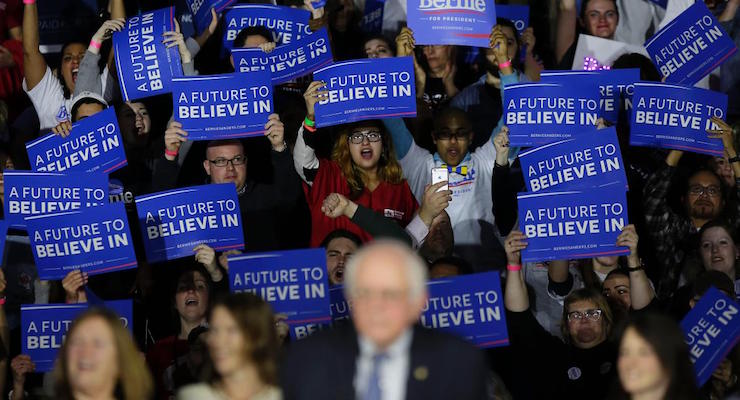

People cheer as Democratic presidential candidate Bernie Sanders speaks during his caucus-night event at the at the Holiday Inn, Feb. 1, 2016 in Des Moines, Iowa. (Photo: Joshua Lott/Getty Images)
What happened in the South Carolina primary? Bernie Sanders was asked. “We got decimated, that’s what happened,” he responded.
Here was Sanders at his best. Brutally honest. Averse to spin. Though the independent from Vermont vows to fight on, his lopsided loss in pivotal South Carolina makes his prospects for winning the Democratic nomination increasingly slim.
The question for progressives is: What happens to his passionate followers in the event he leaves the race? Or more to the point: Is there a way to keep his ardent fans ardent about participating in the electoral politics? Will they keep voting when the candidates are less charismatic, when the election’s not in a big-deal presidential year, when the solutions are muddied in the reality of two-party politics?
Sanders’ feat in electrifying younger voters has been extraordinary. And that extends to his success with many young Latinos and African-Americans, whose elders went overwhelmingly for Hillary Clinton.
But the fickleness of the youth vote has been the bane of progressive politics. It is why the right wing controls Congress.
In 2008, a political rock star named Barack Obama energized the young electorate with talk of radical transformation. The voters’ idealistic fervor helped sweep him into office and expanded the Democratic majority in Congress.
The economy was in free fall. But in the first two years of his presidency, Obama helped steer America from the precipice of another Great Depression — plus he pushed the passage of the Affordable Care Act, bringing health coverage to millions of uninsured Americans. It was hard work, not magic, that accomplished these remarkable things.
Many of his younger voters, led to believe in Technicolor miracles, were unimpressed. The 2010 midterms came around, and they stayed home. Not so the older tea party Republicans, who despised much of what Obama stood for.
Here’s the thing about these right-leaning activists: Sometimes they have a candidate they adore. Sometimes they don’t. But they vote. They vote in presidential years and in non-presidential years, when the public isn’t paying much attention. They vote for the state legislators who usually end up creating districts that favor their party’s candidates.
So as older conservatives marched to the polls, many young liberals did a vanishing act. Having represented 18 percent of the electorate in 2008, voters under the age of 30 accounted for only 11 percent in 2010, their poorest performance in two decades.
Democrats suffered devastating losses, and progressive priorities went into the deep freeze.
It’s true that younger Americans tend to move more often, and that complicates the process of registering to vote and finding the polling place. But still. The youth turnout in the 2014 midterm was even more dismal than in 2010 — actually, the lowest in 40 years.
It is the nature of liberal politics to be cerebral, and with that comes the “critique.” Rather than marvel that near-universal coverage happened at all, prominent voices on the left attacked the reforms as a surrender to business interests. They bashed Obama for not slapping more cuffs on the Wall Street operators.
These complaints were not without merit, but politics is always a work in progress. One keeps plugging away.
Sanders is a no-excuses type of guy. He’s in an especially strong position to do some truth-telling to the young electorate that has rallied to his cause. If they think that the economy is rigged against them, they have to vote out the politicians who have done the rigging. They must play the long game.
One politician’s magnetism isn’t going to do it. Just ask President Obama.
The most damning journalistic sin committed by the media during the era of Russia collusion…
The first ecological study finds mask mandates were not effective at slowing the spread of…
On "What Are the Odds?" Monday, Robert Barnes and Rich Baris note how big tech…
On "What Are the Odds?" Monday, Robert Barnes and Rich Baris discuss why America First…
Personal income fell $1,516.6 billion (7.1%) in February, roughly the consensus forecast, while consumer spending…
Research finds those previously infected by or vaccinated against SARS-CoV-2 are not at risk of…
This website uses cookies.
View Comments
Let's hope they vote Donald J. Trump (y)